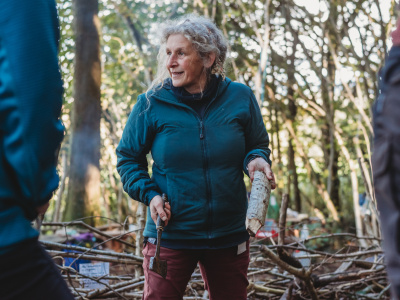
Introduction to Green Woodworking
- The Green Wood Centre
- 12 Jul 2025
The Small Woods Association believes passionately in British woodlands being owned and actively managed in a sustainable and holistic manner. Our focus is therefore on managing woodlands for a combination of environmental, societal and economic reasons as a complete package, and supporting you to do just that; whether you are a woodland owner, manager, worker, student or supporter.
We exist to support and provide opportunities for those who want to see small woodlands sustained for future generations. We are very much led by what our members need to achieve this through their own woodlands.
To benefit from the depth and breadth of our expertise and support, and have your say in the work of The Small Woods Association, please become a Member. Alternatively you can call us on 01952 432769.
Buying, Owning and Committing Time To Woodland
Achieving the multiple benefits that woodlands can offer to wildlife, to people and to the economy is central to government environmental policy and forestry sector policy. Woodlands are also at the forefront of adaptation and mitigation to the climate and biodiversity emergency. Many are attracted to the sense of wellbeing that being in woodlands provides them and others, others are drawn to protecting and appreciating woodland wildlife, others are employed in woodland work. Whatever your reasons and motivations, buying and managing a woodland has become a more attractive, popular and achievable prospect in recent years like never before, and an opportunity to play a part in making a real difference.
Owning and managing a woodland can be one of the most rewarding experiences, but it can also be challenging, so it is important you approach it with an objective and open mindset aswell as with the passion and excitement in your heart. Aswell as doing your background research like you would before taking on an older dream house, it is also worth asking yourself some fundamental questions, including: Can I financially afford to buy and manage woodland? What are my motivations and interests in woodland? What type of woodland do I want to become involved with and where? How much time can I afford to commit regularly? Do I have none, some or all of the skills required?
The Importance of Small Woodlands
Though there is no universally agreed definition of what constitutes a small woodland, most Small Wood Members typically own and manage woodland of around 10ha or less. Forestry Commission data on woodland sizes shows that collectively, all small woodlands of 10ha or less, are 20% of the entire woodland extent in Great Britain. That is >600,000 ha - an appreciable number.
Small woodlands add habitat diversity and make significant contributions to landscape character in urban and rural landscapes; they provide profit for small woodland businesses, employment and self-development opportunities for those who seek a second chance in life, and accessible human health and wellbeing for local communities.
Small woodlands are particularly vulnerable being modest in individual extent, fragmented and facing multiple pressures in intensively managed landscapes. Such woodland are overlooked by regulation and policy. Many struggle to make owning and managing small woodlands viable, and feel their views are not represented in strategic decision making in the forestry sector.
So whilst these woodlands may be small in individual extent they are comparatively mighty in the benefits they confer to the economy, to people and to the environment relative to their modest size. Small woodlands and the people that own and manage them deserve to be safeguarded and nourished.
Why Managing Woodlands Does Matter
The British landscape has been and still is an actively managed one, and that includes woodland. British woodlands have become fragmented and have been actively disturbed, managed or created to varying degrees by humans for hundreds to thousands of years. These woodlands are no longer pristine nor wild primary forests that are self-sustaining without some form of management.
In addition to being impacted by a lack of management, British woodlands are being impacted from an array of pests and diseases, many of which have been introduced to woodlands through human activity. There is a moral obligation to intervene to mitigate these adverse human-made impacts.
There are some examples where unmanaged woodland benefits one or two particular species or species groups such as bats or fungi, but on the whole, biodiversity and a range of woodland specialist species decline significantly in neglected and unmanaged woodlands.
So with great public and political focus on the desirability of planting, it can be easy to forget that planting is just the very beginning of the story of a woodland, with a whole series of tasks being required if woods are to achieve and maintain some sort of maturity with favourable management. For example felling trees as part of a thinning regime, to select for healthy tree specimens showing good form and give them enough light and space to grow into maturity, is essential to ensure the woodland can attain what we might recognise as woodland.
British woodlands provide many environmental, social and economic benefits. Woodlands are therefore an invaluable natural capital asset in addressing the climate and biodiversity crisis and ensuring a sustainable and resilient society.
Woodlands that have a reason to be managed, perhaps for timber, firewood, recreational access, access for health and wellbeing, or green woodworking, are more likely to receive the management they need to thrive long into the future. Indeed those woodlands that exist today have survived precisely because they have had a value to the local community.
A further overview of the importance of managing for environmental, societal and economic reasons, where one or more of these are your primary objectives, is provided in the links below.